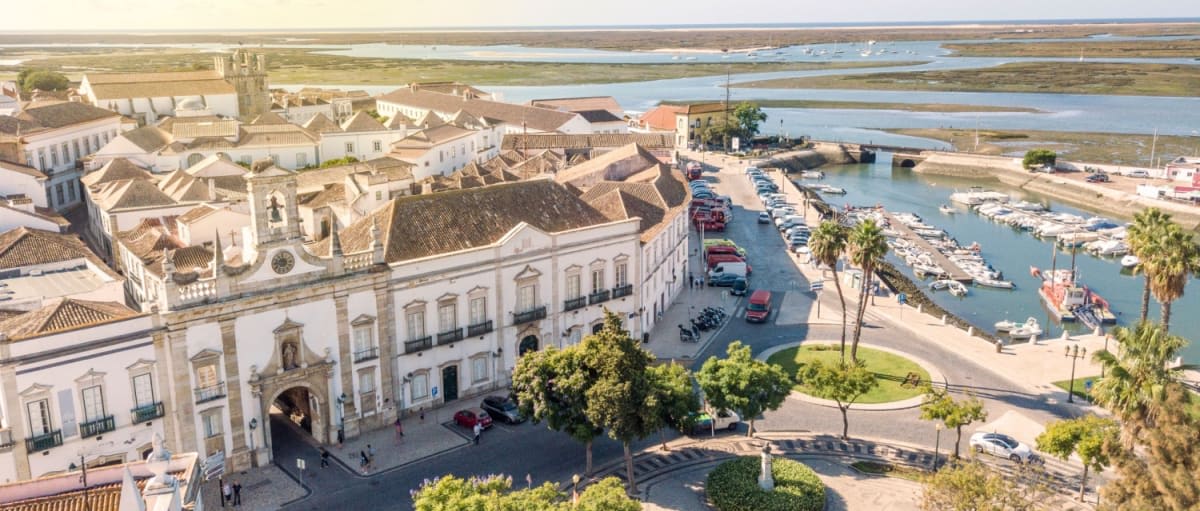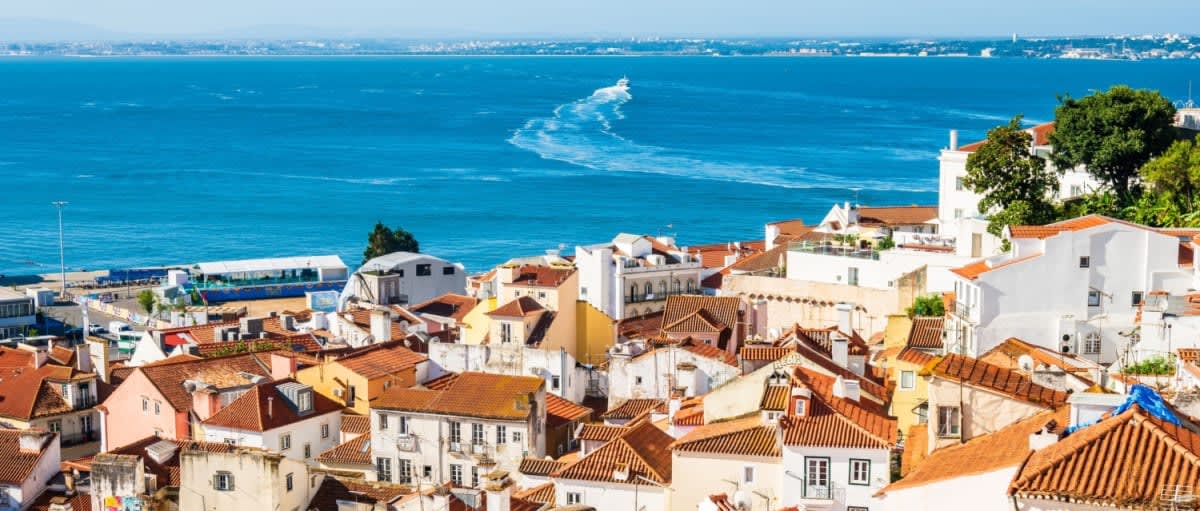Buying property in Portugal is entirely legal for foreigners, regardless of your nationality. Whether you’re from the European Union or beyond, you can purchase property or land in Portugal without facing government restrictions. so, if you’re asking ‘Can I buy property in Portugal?’, we have all the answers below.
Portugal continues to be a favourite among overseas buyers for its quality of life, strong property rights and affordable coastal and rural homes. However, depending on how long you intend to spend in the country each year, you may need a visa. Property purchases can also trigger obligations for local taxes, and if you’re renting it out, further financial responsibilities.
In this article, we’ll break down what to expect when buying as an EU or non-EU citizen, explore visa requirements and explain what the changing legal landscape means for property investors.
Download the Portugal Buying Guide
Contents

Legal rights for foreign buyers
Portugal does not impose restrictions on the purchase of real estate by international buyers. This includes land, residential homes and commercial property. Whether you are an EU national or from outside the European Union, you have the same rights as a Portuguese citizen when it comes to owning property.
There are very few exceptions to this. If your country is subject to international sanctions, you may face barriers to property ownership, but these are rare. For most buyers – from the UK, US, Canada, Australia, and elsewhere – the process is accessible and governed by clear legal frameworks.
Foreign buyers must obtain a Portuguese fiscal number (Número de Identificação Fiscal or NIF) before they can complete a property transaction. You will also need to retain a local lawyer and notary to register the purchase and manage the property transfer. All contracts and legal documentation will be in Portuguese, and although translation is not legally required, working with bilingual professionals will make the process much easier.
Despite your right to own property, this does not automatically allow you to live in Portugal full time. Nationals from outside the EU will need to consider visa options if they wish to stay beyond 90 days in a 180-day rolling period.
For more detail of this, and every step, in the buying process, claim your free copy of our Portugal buying guide:
Download the Portugal Buying Guide
Buying in Portugal as an EU citizen
EU citizens benefit from freedom of movement within the European Union, and that includes the ability to purchase, reside in and work from a property in Portugal. You do not need a visa or residency permit to live in Portugal, whether short-term or permanently.
However, if you plan to stay in Portugal long term, you must register with the local council (Câmara Municipal) within 90 days of arrival. This includes securing a Certificate of Registration, which confirms your legal presence as a resident. You will also need a valid passport or national ID card to complete this registration.
While buying is straightforward, it’s important to understand that most contracts and proceedings are conducted in Portuguese. Unless you are fluent, you should work with experienced experts who can explain each step and minimise confusion. At Your Overseas Home, our approved legal and property contacts are used to helping EU citizens navigate these details.
If you plan to finance your purchase through a mortgage, expect Portuguese banks to assess your income and credit background. Most EU nationals can access mortgage products at favourable rates, but lenders may be more cautious if you earn in a currency outside the eurozone.
In addition to the purchase price, allow for approximately 7–10% in related costs, covering stamp duty, legal fees and notary services.
Buying in Portugal as a non-EU citizen
Non-EU citizens are welcome to buy property in Portugal, with no restrictions on the type of property or land. The buying process mirrors that for EU citizens and locals, and you’re protected by the same legal standards.
While ownership is open, how long you can stay in Portugal each year depends on your visa status. Visitors from many countries, including the UK and US, fall under the Schengen area’s short-stay rule: a maximum of 90 days within any 180-day period. If you wish to exceed this, you must apply for a long-stay visa before travelling.
Popular visa categories include the D7 visa (for those with passive income), the D2 visa (for entrepreneurs) and the digital nomad visa launched in 2023. This last route is ideal if you work remotely and want to spend more than three months at your Portuguese property. In 2025, the long-stay visa system remains streamlined and efficient but still requires preparation. Be ready to submit proof of income, health insurance and a Portuguese NIF.
If you want to finance your purchase with a mortgage, lenders will request more documentation than for residents. Expect a lower loan-to-value ratio (usually around 60–70%) and translated financial records. Portuguese banks will want to see your income and assets clearly documented, and not all institutions lend to non-residents.
As a property owner, you’ll also face annual taxes, including the Municipal Property Tax (IMI) and possibly additional levies if your property is worth over €600,000. Rental income is also taxable whether the property generates full-time or occasional income.
Property investment considerations
Many foreign buyers purchase property in Portugal not just for personal use, but as part of an investment strategy. While this remains viable in 2025, it’s essential to understand recent legislative changes around short-term lettings and tourism pressure.
In 2023, Portugal introduced the “Mais Habitação” housing law to tackle rising property prices, especially in coastal cities such as Lisbon and Porto. As a result, there are now limits on issuing new short-term rental licences in several popular areas. Some municipal councils are also restricting secondary homes that are used primarily for holiday rental.
Before purchasing a property to let, particularly as a holiday rental, check the local rules for that city or region. These vary by municipality and can affect the number of days per year the property can be rented or whether you are eligible for an AL (Alojamento Local) licence at all.
Long-term rental remains largely unaffected, but be aware that landlord-tenant laws in Portugal tend to favour the tenant. Make sure you understand your legal responsibilities, including registration with the tax office and the need to declare earnings through the Portuguese tax system.
Property buyers with long-term investment goals may consider less restrictive areas that continue to welcome rental activity. Inland regions, smaller towns and less tourist-heavy parts of the Algarve offer compelling yields without overregulation.
Working remotely in Portugal
Portugal continues to grow in popularity among digital nomads and remote workers. If you plan to work remotely from your Portuguese home, there are few restrictions as long as you comply with your immigration and tax requirements.
For non-EU citizens staying under 90 days, you can effectively use your property as a base for remote work, provided you remain a tax resident in your home country. This assumes you are not working for a Portuguese employer or establishing a local business.
However, if you’re planning to live in Portugal for 90 days or longer, you’ll need a suitable visa. The digital nomad visa, officially known as the “D8” visa, launched in late 2022 and continues to be one of the most flexible options in 2025. Applicants must show proof of income from a foreign company or clients, usually at least four times the Portuguese minimum wage – approximately €3,280 gross per month in 2025.
Approved applicants can stay in Portugal for up to 12 months, with the option to renew or convert to longer-term residency. It also provides the right to live across Schengen countries during your visa period.
If you remain in Portugal for more than 183 days in a year, you’ll become tax resident, which means declaring global income. The Non-Habitual Resident (NHR) tax scheme closed to new applicants in 2023, but other tax benefits may apply. Consult a bilingual accountant who understands cross-border taxation to avoid costly mistakes.
Start your Portugal property search
Portugal offers a welcoming and transparent property market for international buyers. From coastal escapes to rural retreats and city apartments, there is a property to suit any budget or lifestyle.
Ready to start your journey? Speak to one of our expert property consultants today for step-by-step help.
If you’re wondering whether you can buy in Portugal, the answer is yes – but knowing how to buy property in Portugal is just as important. Our complete guide walks you through every legal and financial step. You can also explore where to buy property in Portugal for inspiration on the best regions to suit your lifestyle, visa goals or investment plans.
Frequently asked questions about buying property in Portugal
Yes, Portugal has no restrictions on foreign property ownership. EU and non-EU citizens alike can legally purchase land, homes or commercial buildings in their name.
No visa is required to purchase property. However, non-EU citizens will need a visa to stay in Portugal longer than 90 days in any 180-day period.
You’ll need a Portuguese tax number (NIF), valid ID, and a local bank account. A solicitor and notary will guide you through the purchase and registration process.
Yes, both EU and non-EU buyers can apply for a mortgage. Non-residents should expect to provide extra documentation and may receive a lower loan-to-value ratio.
While buying property alone doesn’t grant residency, you can apply for long-stay visas such as the D7 or digital nomad visa if you meet the income and stay requirements.









